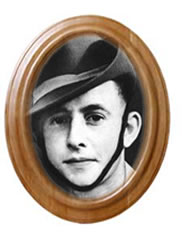
Return To Veterans Accounts Index
Wounded Behind Enemy Lines
by
Pte. Charles Thomas Edward Smith 5350789
.....I
was a member of C Company 2nd Battalion The Royal Berks. I was called up on
the 29 January 1942, aged 19 and went to Brock Barracks, for basic training
at Reading and in Norfolk. I travelled all over the place. After basic training
I embarked from Liverpool in February 1943 aboard the Troopship Strathmore,
I believe, arriving at Bombay where we were all transported straight away up
to Deolali, it was tented, wherever you looked there was tents, all over, flat
based landscape.
.....At one point I don’t know when but there was a mix-up, because we got
sent up into Burma and we had travelled so far out and then got recalled again,
and we finished up back down at Deolali.
.....Those who lost their lives when I got wounded was, Hackett, Private Hackett
and Butler.
.....On the 26 December 44 we were on patrol and went in behind the Japanese lines
and on our return we got ambushed. I know there was three killed and two wounded
to my knowledge. We put up flares, and brought down a barrage of 25Ib shells
on their position, also smoke as well. Corporal Tivey, he got up and ran to
where I was, I was by a tree, and no sooner than he got down, they opened up
with their machineguns and it came down right between the middle of us, nether
were wounded, but in the end I did get wounded.
.....To be honest I didn’t feel anything, I felt a bang, but I didn’t
know until I looked down and saw I had a gaping hole in my leg, I did my own
dressing, using my field dressings and both field dressings went into the hole,
as though there was nothing there to support it. I finished the bandaging and
used my putties around the wound to keep it all in place. The trouser acted
like a guttering and in the time I was there the trouser leg just filled up
with blood. I laid there all night, till the next morning, seven or eight o’clock
in the morning.
.....I laid there all night, and the next morning we started our advance again and
I called out, I thought they were bloomin’ going to shoot me, because
the Japs, always called out names, and what have you. The sergeant sent two
men back to get a stretcher and he waited until they came back and no sooner
they got back he said, ‘Come on, well carry on.’, and as I said
before, the poor bloke got shot, exactly where I had been laid up all night.
I could actually hear the Japs talking during the night; they were that close
to where I lay wounded.
.....I was taken into the Field Dressing Station, and I was in there two days I
think, and there I met Major-General Rees. I was took by ambulance to an airstrip
and then flown out. I finished up at Assam and that is where I was operated
on. After a few days a nurse was talking to me and I happened to say to her, ‘Should
I have some lumps in me groin?’ and she said, ‘Let me have a look.’ No
sooner had I said that I was down in the theatre, what you call it had set
in, gangrene.
.....We went from there to a hospital in Chittagong, and there I met Lord Mountbatten’s
wife. We were later put on a boat and taken down to Madras. We were then put
aboard a hospital ship, a coal burner, when I was in the Red Sea I had my plaster
taken off for the last time, that’s when I saw the hole in my leg was
still there. I thought, that’s the end of my football and everything.
They looked after us well, during the voyage home.
.....We landed at Southampton, and they said, ‘You will be taken to your nearest
hospital.’ We got on the train, and I finished up in Bradford, and I
was up there about a week and after being discharged travelled back down. I
had to change transport at different places with me kitbag and what have you.
I finally got to Thatcham, where I was living at the time. A bus pulled up
that was going passed where I lived, and I asked if he could you give me a
lift up to the top of the hill? he said, yea, get on, and dropped me outside
my door, and went in and got my mother and father.
.....When I was in hospital, who should come in, but Corporal Tivey, he’d
been shot through the chest, and he stopped there for so long, and they done
him all up and sent him back to the front again.

Pte. Charles Thomas Edward Smith
